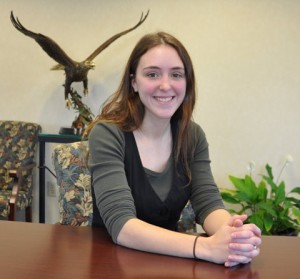
As a freshman at Clarion University, Alysha Cypher of Cabot, Pa., took the lead on a research project, tracking a reintroduction of fishers and river otters from the 1990s.
As a sophomore, the biology major with minors in chemistry and sustainability worked with biology professor Dr. Andrew Turner studying the chemosensory abilities in fish – how their sense of smell is affected by chemicals in the water – as well as the effects of pollution and pH changes in the behavior of fish.
Altogether, she has done six of her own research projects, and she has assisted on 10 others. She co-founded the Center for Conservation Studies, as well as Scuba Club.
“When I originally came to Clarion University, I was interested in marine biology, but there was nothing like (a scuba club) here,” Cypher said. Together, she and a friend founded the club and certified about 30 others in scuba diving. Through the club, Cypher has led her fellow students on scuba diving expeditions in Honduras and locally.
Now a senior, Cypher is seeing more of her work pay off. She has partnered with biology professor Dr. Andrew Keth to develop the Amphibian Research Center on the grounds of nearby Clarion-Limestone School District. When finished, the center will be a place where Clarion University and Clarion-Limestone students can learn about amphibians, but the center will be open to the community, too.
Together these experiences have helped Cypher to develop confidence and authority, and she is already taking a leadership role in her field.
“As a scientist it’s my obligation to be able to talk to non-scientists, other scientists and people who want to become scientists,” Cypher said. “Coming into science I thought I could be alone, working in my lab and doing my thing, but I can’t imagine a more social job.”
Cypher wants to share her enthusiasm with future generations by teaching.
“I like research, but I’m more passionate about teaching. I like inducing that ‘eureka’ moment,” she said. “I want to show them that it’s cool, that they don’t have to love it, but they should respect nature and understand they’re a part of it.”


